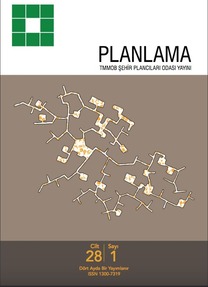A Review of the Environmental Sustainability History of the World and Turkey
Çevresel Sürdürülebilirliğin Dünya ve Türkiye'deki Tarihine Dair Bir İnceleme
___
A World Bank economist apologized. (2018, January 13). Retrieved from https://qz.com/1179239/world-bank-doing-business-ranking-chiefeconomist- paul-romer-apologizes-for-unfair-results/Anderson, T.L., & Leal, D.R. (2001). Rethinking the way we think. in: free market environmentalism. New York: Palgrave Macmillan.
Büyükduman, A. (2014). Bir kent efsanesi konut balonu. İstanbul: Scala Press.
BP oil spill timeline. (2010, July 22). Retrieved from https://www.theguardian. com/environment/2010/jun/29/bp-oil-spill-timeline-deepwater-horizon
Checker, M. (2011). Wiped out by the “greenwave”: environmental gentrification and the paradoxical politics of urban sustainability. City and Society, (23),210–229.
Çoban, A. (2018). Doğanın metalaştırılması. Toplum ve Bilim, (123), 209-241 Does the World Bank have a problem. (2017, November 09). Retrieved from https://lens.monash.edu/@business-economy/2017/11/09/1257471/ does-the-world-bank-have-a-problem-with-its-poverty-figures
Delmas, A., & Burbano, V. (2011). The drivers of greenwashing. California Management Review, 54(1), 64–87.
Demir, G. (2011). Post neoliberalizm? kriz ve sonrası üzerine. The Journal of Marmara Social Research, December(1), 1-20.
Demirer, G., & Duran, M. (2000). Marksist ekoloji anlayışı üzerine. M. Duran, G. Demirer and G. Özgür (Ed.), in Marksizm ve Ekoloji (pp.180- 183). İstanbul: Öteki Press.
Dresner, S. (2008). The principles of sustainability (2nd ed.). London: Routledge. EPI (Environmental Performance Index). (2018, May 01). Retrieved from https://epi.envirocenter.yale.edu/epi-topline
Eşkinat, R. (2012). Türk inşaat sektöründe TOKİ’nin yeri ve etkisi. Dumlupınar University Journal Of Social Sciences, 2(32), 159-172.
Ferrao, P., & Fernandez, J. (2013). Green urban policies and development in sustainable urban metabolism. Cambridge: MIT Press.
Gaffney, H. (2013). Between discourse and reality: the un-sustainability of mega event planning. Sustainability, (5), 3926- 3940
Hangi ilde ne kadar 2B. (2012, May 7). Retrieved from https://www.sabah. com.tr/ekonomi/2012/05/07/hangi-ilde-ne-kadar-2b-var
Hamilton, K., & Clemens, M. (1999). Genuine savings rates in developing countries. The World Bank Economic Review, 13 (2), 336-356.
Hammond, A., Adriaanse, A., Rodenburg, E., Bryant, D., & Woodward, R. (1995). Environmental indicators: a systematic approach to measuring and reporting on environmental policy performance in the context of sustainable development. World Resources Institute Press. Retrieved from http://pdf.wri.org/environmentalindicators_bw.pdf
Hilty, L.M., & Aebischer, B. (2015). ICT for sustainability: an emerging research field. L.M. Hilty, B. Aebischer (Ed.), in ICT innovations for sustainability advances in intelligent systems and computing, Heidelberg: Springer International Publishing.
Hovi, J., Sprinz, D., & Bang G. (2010). Why The United States did not become a party to The Kyoto Protocol: German, Norwegian, and US perspectives. European Journal of International Relations, 18(1), 129–150
James, P. (2015). Urban sustainability in theory and practice: circles of sustainability. London: Routledge Press.
Jardins, R. J. (2006). Çevre Etiği. (Translation R. Keleş). Ankara: İmge Press. Kanada Kyoto Protokolü'nden çıktı. (2011, December 13). Retrieved from http://tr.euronews.com/2011/12/13/kanada-kyoto-protokolu-nden-cikti
Keleş, R., & Hamamcı, C. (1997). Çevrebilim. Ankara: İmge Press.
Kılınç, A. (2012). Neoliberalizm bağlamında sürdürülebilir kalkınmanın merkez ve çevre ülkeler açısından değerlendirilmesi. Afyon Kocatepe University İİBF Journal, 14(1), 147-161.
Kidd, C.V. (1992). The evolution of sustainability. Journal of Agricultural and Environmental Ethics, 5(1), 1-26.
Krausmann, F., Gingrich, S., Eisenmenger, N., Erb, K., H., Haberl, H., & Fischer- Kowalski, M. (2009). Growth in global materials use, GDP and population during the 20th century. Ecological Economics, 68(10), 2696-2705.
Kuhlman, T., & Farrington, J. (2010). What is sustainability? Sustainability, 2(11), 3436-3448.
Larner, W., & Walters, W. (2004). Global governmentality governing international spaces. London: Routledge.
Mega Projeler İstanbul, (2020). Retrieved from https://megaprojeleristanbul. com/#
Mengi, A., & Algan, N. (2003). Küreselleşme ve yerelleşme çağında bölgesel sürdürülebilir gelişme. Ankara: Siyasal Press.
Ministry of Finance Directorate General of National Property. (2012). Annual report. Retrieved from http://kurumsal.milliemlak.gov.tr/Faaliyet%20 Raporlar/2012_YILI_MILE_FAALIYET_RAPORU.pdf
Ministry of Agriculture and Forestry. (2020). Retrieved from https://www. tarimorman.gov.tr/
Parkin, S. (2015). Contexts and drivers for operationalizing sustainable development. In Proceedings of the ICE-Civil Engineering. (pp.9-15), London:Thomas Telford Ltd.
Robert, K. W., Parris, T. M., & Leiserowitz, A. A. (2005). What is sustainable development? Goals, indicators, values, and practice, environment. Science and Policy for Sustainable Development, 47(3), 8-21.
Schuetze, T., & Chelleri, L. (2016). Urban sustainability versus green-washing- fallacy and reality of urban regeneration in Downtown Seoul. Sustainability, 8(33), 1-14.
TerraChoice. (2010). The Sins of Greenwashing Home and Family Edition. Retrieved from http://sinsofgreenwashing.com/index35c6.pdf
Karadeniz HES kuşatmasında. (2013, October 17). Retrieved from https:// www.hurriyet.com.tr/gundem/karadeniz-hes-kusatmasinda-24931846
Tok, E., & Oğuz, M. (2013). Manifestations of neoliberal urbanisation: The case of Sulukule/Istanbul. Planlama, 23(2), 57-66.
TOKİ received The United Nation’s. (2018, March 28). Retrieved from http://www.toki.gov.tr/en/international-experience.html
U.N (United Nations). (1987). Report of the World Commission on environment and development: Our common future. Oslo: U.N Press.
U.N (United Nations). (2007). Indicators of Sustainable Development: Guidelines and Methodologies, October 2007 Third Edition, Retrieved from http://www.un.org/esa/sustdev/natlinfo/indicators/guidelines.pdf
U.N (United Nations) - Habitat. Global Activities Report. (2017). Retrieved from https://unhabitat.org/global-activities-report-2017/
U.N (United Nations). New Urban Agenda. (2017). Retrieved from http:// habitat3.org/wp-content/uploads/NUA-English.pdf
Van Den Berg, K. (2016). Neoliberal sustainability? The biopolitical dynamics of “green” capitalism, global governance/politics, Retrieved from https:// www.iss.nl/sites/corporate/files/31-ICAS_CP_van_der_Berg.pdf
WWF (World Wildlife Fund). (2014). Living planet report. Retrieved from https://www.wwf.or.jp/activities/data/WWF_LPR_2014.pdf
Yıkılmaz, N. (2016). Yeni dünya düzeni ve çevre. İstanbul: Umay Press.
- ISSN: 1300-7319
- Yayın Aralığı: 3
- Başlangıç: 1986
- Yayıncı: TMMOB Şehir Plancıları Odası
İklim Değişikliğine Uyumda Mekânsal Planlama ve Akıllı Yönetişim Çerçevesinde Türkiye
Rüzgârdan Enerji Üretiminin Sosyo-Mekânsal Duyarlılık Alanları: İzmir Örneği
Sakin Şehir Markalaşmasının Kentsel Mekâna Etkilerinin İncelenmesi: Sığacık Örneği
Dalya Hazar Kalonya, Görkem Gülhan, Aysun Aygün
Mekânsal Planlamada Deprem Riski ve İklim Krizini Birlikte Ele Almak
Çevresel Sürdürülebilirliğin Dünya ve Türkiye'deki Tarihine Dair Bir İnceleme
Planlamanın Yeşil Gündemi: İklim Değişikliği, Temiz Enerji, Çevreye Saygılı Bir Gelecek
A Review of the Environmental Sustainability History of the World and Turkey
Mehmet EROĞLU, Aslı Öğüt ERBİL
Konya Kentsel Alanının Büyümesinde Kentsel Saçaklanma ve Nedenleri
Hale ÖNCEL, Mehmet Çağlar MEŞHUR
Türkiye Kentlerinin Sürdürülebilir Yaşam Kalitesi Temel Bileşenlerinde Dağılımı ve Kümelenmesi
